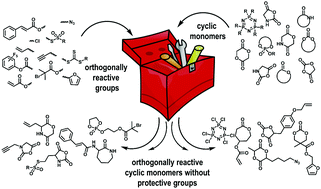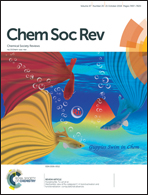Functional biodegradable polymers via ring-opening polymerization of monomers without protective groups
Abstract
Biodegradable polymers are of current interest and chemical functionality in such materials is often demanded in advanced biomedical applications. Functional groups often are not tolerated in the polymerization process of ring-opening polymerization (ROP) and therefore protective groups need to be applied. Advantageously, several orthogonally reactive functions are available, which do not demand protection during ROP. We give an insight into available, orthogonally reactive cyclic monomers and the corresponding functional synthetic and biodegradable polymers, obtained from ROP. Functionalities in the monomer are reviewed, which are tolerated by ROP without further protection and allow further post-modification of the corresponding chemically functional polymers after polymerization. Synthetic concepts to these monomers are summarized in detail, preferably using precursor molecules. Post-modification strategies for the reported functionalities are presented and selected applications highlighted.



 Please wait while we load your content...
Please wait while we load your content...